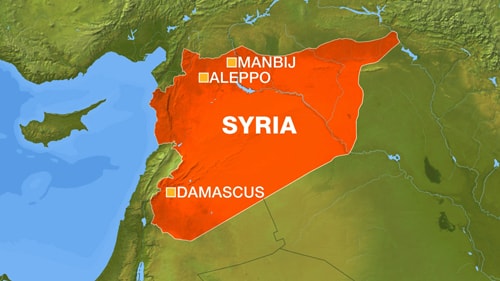The Five Tigers' Situation in Syria After the Destruction of IS
The collapse of IS could plunge the US and the warring parties in Syria deeper into a power struggle with no way out.
Armored vehicles with US flags are present in Manbij, Syria
Syrian President Bashar al-Assad recently accused the US of "invading" by deploying military forces on Syrian territory without the permission of the legitimate government. With the presence of US ground troops, the Syrian battlefield is now gradually turning into a "five-tiger" battle once the self-proclaimed Islamic State (IS) rebels disintegrate, according to National Review.
Matthew Continetti, a veteran security analyst in Washington, said that with the presence of the Russian army, the Syrian government army, the Turkish military, the Kurdish militia and now US special forces and artillery, IS no longer has a chance to survive.
But Continetti also warned that recent events suggest that the crushing of IS in Syria is just the beginning of a new US intervention in the Middle East, with costs that the American people and President Donald Trump may not yet have imagined.
The city of Manbij in northwestern Syria can be seen as a typical case of the struggle for influence between the parties in this country after the defeat of IS. Kurdish militias, with the support of the US air force, and Turkish armored units, drove IS out of this important town since last year.
But in recent days, Humvees and Stryker infantry vehicles flying American flags have been a regular sight in the city. Their mission is not to destroy IS, but to carry out something much less military: a campaign of “deterrence and reassurance” to prevent rival factions from killing each other in the area recently cleared of IS.
One of the targets that the US military must deter in Manbij is the Turkish military, a NATO member and ally of the US in the fight against IS. Turkish military units crossed the Syrian border, approaching Manbij in the name of destroying IS, but their deep target is the Kurdish militia (YPG).
Ankara accuses the YPG of having links with the Kurdistan Workers Party, an organization that Türkiye considers a terrorist organization, and wants to prevent them from establishing an autonomous region right on its border. However, the YPG is the most effective pro-US force fighting IS, an indispensable component in the fight to destroy IS in its stronghold of Raqqa.
The situation is further complicated by the presence of Russian troops in Manbij, which are helping Syrian government forces manage villages that have just been liberated from IS control.
 |
| The spirit of the war in Syria after its demise |
The Kurds themselves invited the Russian military to provide security in the liberated areas of Manbij, apparently seeing it as a counterweight to Turkish influence. The result was a confluence of five powerful armed forces – Russia, the US, Türkiye, Syria and the Kurdish militia – all gathered in an unfamiliar city that had little strategic importance.
Walked out the door
In such a confined space, the gathering of the “five tigers” significantly increases the risk of miscalculation and unfortunate misunderstandings. In a meeting with Russian and Turkish generals earlier this week, Chairman of the US Joint Chiefs of Staff Joseph Dunford said that Manbij was now “a potential tinderbox.”
Ralph Peters, a columnist for the NY Post, argues that after the fall of IS, the US will be the biggest loser in the war in Syria. The moderate rebels backed by the US have been largely wiped out, while the Kurdish militias close to them are at odds with Turkey, which itself has recently shown warmer relations with Russia, while the Moscow-backed Assad regime has increasingly consolidated its power.
Once IS is defeated, the US role in the Middle East in general and Syria in particular will no longer be necessary. At that time, Washington will easily fall into the situation of being "shown by the hand to the door", Peters commented.
If the US does decide to stay in Syria, Continetti believes that US involvement in the country will follow the same unfortunate path as before. After achieving the initial narrow objective of destroying IS, the US will have to shoulder many other related responsibilities in the post-conflict period.
US special forces support Kurdish militia against IS in Syria
Similar vague, unspecific policies cost American lives in Lebanon in 1983 and Somalia 10 years later. Where peacekeeping missions have been successful, such as Bosnia and Herzegovina, their mandates have been clearly defined from the start, authorized by the parties involved, and adequately resourced. But none of that has been the case with the US intervention in Syria.
In the struggle for power in Syria, the US will have to answer many big questions, according to Continetti. What happens after IS falls in Raqqa? Should US troops stay in Syria once IS is defeated, and if so, for what purpose? What is the US position on the Kurdish independence movement, and how will it address Turkey if it supports it?
US President Donald Trump is clearly the one who will have to answer these big questions, as well as be ready to defend his proposed plan. With the US and other parties involved in the war in Syria, the situation could end with the lives of soldiers, with the loss of reputation, or even a larger-scale conflict, the expert emphasized.
According to VNE
| RELATED NEWS |
|---|
